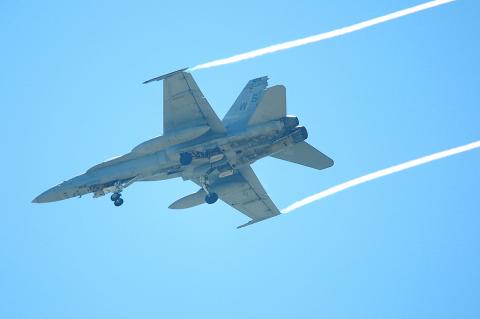Two US F/A-18s landed at an air force base in Tainan yesterday after one of the planes encountered mechanical problems, the Ministry of National Defense said.
The pilots landed at Tainan Air Force Base at 1:19pm after requesting permission to land because of a mechanical glitch in one of the aircraft, the ministry said.
The Civil Aeronautics Administration also confirmed that it had received distress signals from the F/A-18s.

Photo copied by Wang Chun-chung, Taipei Times
Records from the Air Navigation and Weather Service (ANWS), which is responsible for guiding the landing and takeoffs of civilian and military aircraft, showed that a fighter jet had sent signal code “7700” at about 1pm, meaning that the aircraft had encountered an emergency.
As the jets were near airspace over southern Taiwan, the ANWS asked its Kaohsiung Aviation Facilities Station to help guide the aircraft to the Tainan base.
There was no immediate word on where the US fighter jets were coming from or where they were headed.
“We can confirm that two US F/A-18s were traveling together on a routine flight today when one of the aircraft experienced a mechanical problem that required an immediate precautionary landing,” American Institute in Taiwan (AIT) spokesman Mark Zimmer said in response to a Taipei Times inquiry.
“Both aircraft landed in Tainan. Both aircraft and their crew are safely on the ground. We appreciate Taiwanese authorities’ allowing the aircraft to land in Taiwan when this emergency occurred, and accommodating the aircraft while any repairs take place,” he said.
The AIT is still assessing the situation and deciding how to fix the problems, he told the Central News Agency.
The Chinese-language United Daily News reported that the jets had taken off from a US base in Okinawa, Japan, and were conducting a routine patrol above waters north of Taiwan.
A military official, who confirmed that jets from the Republic of China Air Force 443rd Tactical Fighter Wing assisted the fighters with their landing, said he expected the US to send a team to handle any needed repairs, because the air force does not have any F/A-18 aircraft and does not have the ability to repair or maintain the aircraft.
There also were rumors that an EA-6B Prowler electronic warfare aircraft was to land in Tainan along with the F-18s, but ministry spokesman Major General David Lo (羅紹和) denied this.

The US government has signed defense cooperation agreements with Japan and the Philippines to boost the deterrence capabilities of countries in the first island chain, a report by the National Security Bureau (NSB) showed. The main countries on the first island chain include the two nations and Taiwan. The bureau is to present the report at a meeting of the legislature’s Foreign Affairs and National Defense Committee tomorrow. The US military has deployed Typhon missile systems to Japan’s Yamaguchi Prefecture and Zambales province in the Philippines during their joint military exercises. It has also installed NMESIS anti-ship systems in Japan’s Okinawa

TRAGEDY STRIKES TAIPEI: The suspect died after falling off a building after he threw smoke grenades into Taipei Main Station and went on a killing spree in Zhongshan A 27-year-old suspect allegedly threw smoke grenades in Taipei Main Station and then proceeded to Zhongshan MRT Station in a random killing spree that resulted in the death of the suspect and two other civilians, and seven injured, including one in critical condition, as of press time last night. The suspect, identified as a man surnamed Chang Wen (張文), allegedly began the attack at Taipei Main Station, the Taipei Fire Department said, adding that it received a report at 5:24pm that smoke grenades had been thrown in the station. One man in his 50s was rushed to hospital after a cardiac arrest

PUBLIC SAFETY: The premier said that security would be tightened in transport hubs, while President Lai commended the public for their bravery The government is to deploy more police, including rapid response units, in crowded public areas to ensure a swift response to any threats, President William Lai (賴清德) said yesterday after a knife attack killed three people and injured 11 in Taipei the previous day. Lai made the remarks following a briefing by the National Police Agency on the progress of the investigation, saying that the attack underscored the importance of cooperation in public security between the central and local governments. The attack unfolded in the early evening on Friday around Taipei Main Station’s M7 exit and later near the Taipei MRT’s Zhongshan

ON ALERT: Taiwan’s partners would issue warnings if China attempted to use Interpol to target Taiwanese, and the global body has mechanisms to prevent it, an official said China has stationed two to four people specializing in Taiwan affairs at its embassies in several democratic countries to monitor and harass Taiwanese, actions that the host nations would not tolerate, National Security Bureau (NSB) Director-General Tsai Ming-yen (蔡明彥) said yesterday. Tsai made the comments at a meeting of the legislature’s Foreign Affairs and National Defense Committee, which asked him and Minister of National Defense Wellington Koo (顧立雄) to report on potential conflicts in the Taiwan Strait and military preparedness. Democratic Progressive Party (DPP) Legislator Michelle Lin (林楚茵) expressed concern that Beijing has posted personnel from China’s Taiwan Affairs Office to its